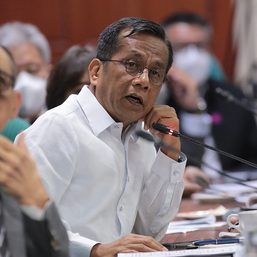SUMMARY
This is AI generated summarization, which may have errors. For context, always refer to the full article.
![[In This Economy] When invoking supply and demand can get you fired](https://www.rappler.com/tachyon/2023/09/cielo-magno-supply-demand-TL-sep-11-2023.jpg)
Never did I think that an Econ 101 concept could prove so threatening to a government.
On Thursday, September 7, news broke that Finance Undersecretary Cielo Magno, a friend and colleague at the UP School of Economics, will be stepping down from her post on orders that came directly from the Palace.
This was after she privately posted on Facebook on September 1 a typical supply and demand diagram with a price cap, accompanied by a caption, “I miss teaching…” The post has since been made public.
(On that same day, the Palace announced that President Ferdinand Marcos Jr. will be imposing price caps on rice effective September 5.)
Getting wind of Cielo’s post, the Palace sent a letter on September 4 to Finance Secretary Benjamin Diokno (another product of UPSE) instructing the “expiration of the tenure” (euphemism for sacking) of Cielo which “shall take effect immediately.”
Cielo later shared that her resignation would take effect September 16, and announced that she’ll be back at UPSE to teach…the law of supply and demand.
Cielo will be the best person to give all the juicy details of the events leading up to her resignation. But suffice it to say that we at UPSE weren’t totally surprised by such a move coming from the Palace. We welcome Cielo back with open arms (in fact, she’s already been given a teaching load.)
What happened here?
What’s so triggering about a supply and demand diagram?
In Econ 101, this model is used to teach two things. First, the usefulness of markets as a way to discover the optimal prices of goods and services; and second, the ill effects of distorting such prices.
Price ceilings, even if well-meaning, can cause more harm than good by creating a gap between demand and supply. (READ: [In This Economy] The bad economics of Marcos’ rice price ceilings)
Already, we’re seeing some of the ill effects of Marcos’ rice price ceilings. Well-milled and regular-milled rice is fast disappearing in markets. Retailers are mulling exiting the market because of the losses they’re suffering.
Consumers, too, have to form long queues and are forced to buy bad-quality rice: yellowish, foul-smelling, and said to be literally for the dogs. That’s the only type of rice that sellers are willing to sell at low prices. Some sellers might also be mixing cheap rice with special rice, since it’s the only way they can avoid further losses.
In short, all these problems are a direct result of Marcos’ price caps. And they’re predictable, too, given the lessons of supply and demand.
But still, the Marcos administration is sticking to its narrative that the price caps are necessary and even effective to “protect” consumers, not just against high prices but also against hoarders and profiteers. The problem is that the price ceilings will likely backfire and even encourage these very things the administration is trying to stop.
Cielo’s graph encapsulates the ill effects of price ceilings. And since this goes against the official narrative, it cost Cielo her job.
That’s exceptionally petty and paranoid, even for the Marcos administration. It goes to show how allergic they are to any whiff of opposition. At this point, they just want “yes men” and “yes women” in their ranks.
There’s a plot twist. On September 8, Secretary Diokno divulged that he and Socioeconomic Planning Secretary Arsenio Balisacan were shocked by Marcos’ price cap order. “We were in Japan when that was announced. I was sitting with Arsi and we were talking to Japanese investors… Of course, we were shocked.”
The difference is that while Cielo expressed frustration about the policy, Diokno and Balisacan kept mum and even supported and justified the President’s action. In a talk with the media, Diokno even called for “responsible social media use” among government officials. (Should everyone in government lose their voice, even in private settings?)
Reformist
Cielo’s departure from the Department of Finance is unfortunate since she was actually doing a lot of good in pursuing certain economic reforms.
For example, she was the one tasked to spearhead reforms when it comes to the military and uniformed personnel (MUP) pension system, which is draining the public coffers at an alarming rate.
Cielo was talking with military and police officials, negotiating possible ways to compel MUPs to contribute to their own pensions. She was also often given interviews about this on media. (Right now, MUP pensions are being financed directly from taxpayers’ money, and the government’s obligations are now in the trillions of pesos.)
Sayang. Cielo was making progress with certain military and police leaders. Let’s just hope that the reforms continue after Cielo leaves.
Before joining government, Cielo was also the chairperson of the Philippine Extractive Industries Transparency Initiative. As an official of the DOF, she was well-placed to ensure that mining taxes were high and reasonable enough to keep the mining industry in the country in check. Again, let’s hope that mining tax reforms are implemented after she leaves.
I’m pretty sure that Cielo will be able to continue her advocacies outside of government. UP’s academic freedom will also allow her to speak freely about certain issues.
Some people ask, “Why did Cielo join the Marcos administration in the first place?” I guess any well-meaning economist confronts that question at the start of any administration, when extended the invitation to serve.
On the one hand, serving the government is restricting in the sense that you’re boxed in and not free to talk about certain issues. On the other hand, it’s an opportunity to pursue real, institutional change. (In this environment, however, that might be difficult if higher-ups are afraid of real change, and instead bent on maintaining the status quo.)
Bad signal
The Marcos government shoots itself in the foot by getting rid of a sensible economist such as Cielo Magno.
It’s hypocritical, in fact, since Marcos himself said at the start of his term that he was willing to work with and appoint critics, regardless of political color. Obviously, his clarion call for “unity” was just for show.
Sacking Cielo also gives a very bad signal to reform-minded individuals who might want to join government.
Experts may choose to stay outside if they know their advocacies will be stopped because of any hint of opposition. Meanwhile, energetic and idealistic young people might also choose to stay away. (I can’t help but contrast this with, say, the situation during the Aquino 2.0 administration, which was able to attract lots of young people to serve.)
Sooner rather than later, the government might be dominated by mere sycophants. That, I think, is the saddest part in all of this. – Rappler.com
JC Punongbayan, PhD is an assistant professor at the UP School of Economics and the author of False Nostalgia: The Marcos “Golden Age” Myths and How to Debunk Them. JC’s views are independent of his affiliations. Follow him on Twitter (@jcpunongbayan) and Usapang Econ Podcast.
1 comment
How does this make you feel?

![[EDITORIAL] Kamaynilaan para sa tao, hindi para sa mga sasakyan](https://www.rappler.com/tachyon/2024/04/animated-traffic-april-2024-carousel.jpg?resize=257%2C257&crop=410px%2C0px%2C720px%2C720px)

![[ANALYSIS] Kilalanin ang bagong Marcos technocrats](https://www.rappler.com/tachyon/2022/05/TL-Marcos-technocrats-May-27-2022.jpeg?resize=257%2C257&crop_strategy=attention)








![[WATCH] #TheLeaderIWant: Filipino voters sound off on community issues a year before 2025 elections](https://www.rappler.com/tachyon/2024/05/filipino-voters-sound-off-on-community-issues-1.jpg?resize=257%2C257&crop=276px%2C0px%2C720px%2C720px)
![[EDITORIAL] Apat na taon na lang Ginoong Marcos, ‘di na puwede ang papetiks-petiks](https://www.rappler.com/tachyon/2024/07/animated-bongbong-marcos-2024-sona-day-carousel.jpg?resize=257%2C257&crop=280px%2C0px%2C720px%2C720px)
![[In This Economy] Delulunomics: Kailan magiging upper-middle income country ang Pilipinas?](https://www.rappler.com/tachyon/2024/07/in-this-economy-upper-middle-income-country.jpg?resize=257%2C257&crop=421px%2C0px%2C1080px%2C1080px)

![[EDITORIAL] Marcos Year 2: Hilong-talilong](https://www.rappler.com/tachyon/2024/07/animated-bongbong-marcos-2nd-sona-carousel.jpg?resize=257%2C257&crop=136px%2C0px%2C720px%2C720px)
![[Newspoint] A fighting presence](https://www.rappler.com/tachyon/2024/07/thought-leaders-a-fighting-presence.jpg?resize=257%2C257&crop=441px%2C0px%2C1080px%2C1080px)
Thanks to Prof. JC Punongbayan for another enlightening article on a politico-economic issue.
Firstly, the sacking of Cielo Magno is indeed “a very bad signal for reform-minded individuals who might join the government.” It is also a signal that now (if not even before), the Marcos Jr. Administration is already “dominated by mere sycophants.”
Secondly, speaking of Unity in the Marcos Jr. Government, it is now clear or clearer that it is only for “show.”
Thirdly, Marcos Jr. just copied Marcos Sr.’s price cap many decades ago. That is why such policy carries with it a strong sentimental value. (Note: Hence the haste, even without the knowledge of this economic team.)
Fourthly, this proves that the Marcos Repression Machinery works well not only against outside-the-government critics but including nonconformists inside the Marcos Jr. government, too. (Note: Government officials and employees beware.)
Fifth and lastly, we should not expect that Mr. Party Boy can appreciate Economics 101 especially the Theory of Supply and Demand. Perhaps, had his Economics 101 Professor explained the said Theory by using the Demand and Supply of Parties as an application example, then he could have learned how to appreciate it. (Assumption: He was diligently attending his Economics 101 classes and was “mentally” present in those classes, too.)